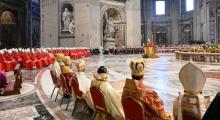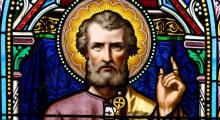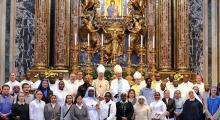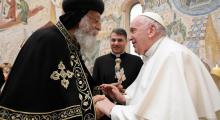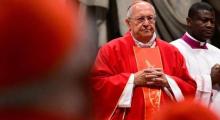Issued by the Catholic Center for Studies and Media - Jordan. Editor-in-chief Fr. Rif'at Bader - موقع أبونا abouna.org
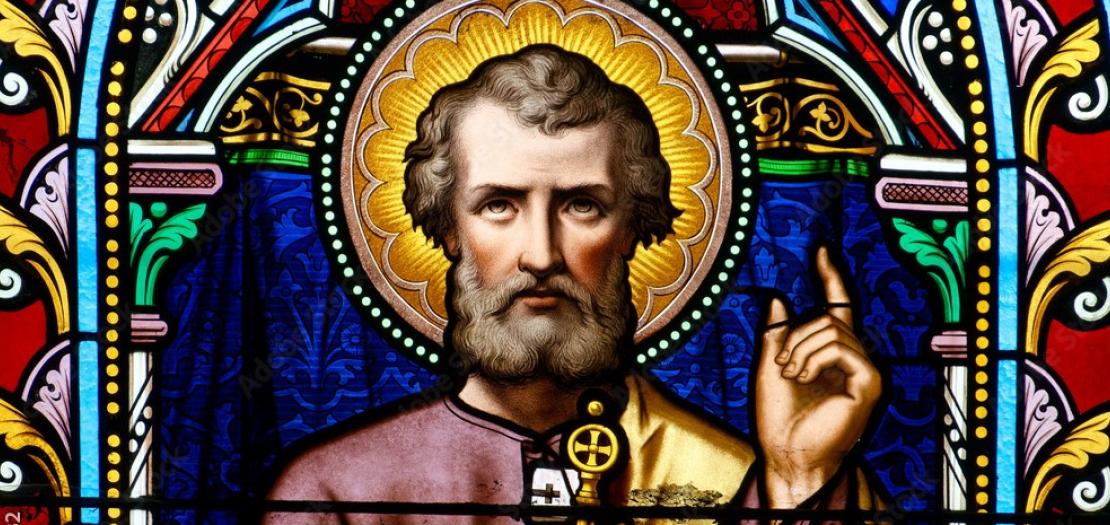
Total trust in God, the awareness of being weak and a sinner, a new call to priests to put themselves at the service of all, his admiration for contemporary martyrs, and his concern for migrants are some of the themes Pope Francis addressed in 2021 in an interview with Noel Díaz at the papal residence of Casa Santa Marta.
Díaz is the founder of lay association ‘El sembrador, Nueva Evangelización’ (ESNE), which announces the Word of God through television and radio. The previously unaired interview with Pope Francis, originally intended to be part of a documentary, is set to be broadcast by ESNE on Friday.
Following is the text of the interview with Pope Francis:
Q. Today, you are the successor of this man called Simon. What does this Scripture remind you of, Holiness?
Pope Francis: So many things! That Jesus calls Simon into the midst of the people, He does not separate him from the people. It was crowded with people, and Jesus preaches, and the people go to listen to Jesus because they are thirsty for the Word of God. And Jesus speaks as one who has authority.
First thing, Jesus always calls His priests from the people, in the midst of the people. If Peter had forgotten his origin, he would have betrayed Jesus’ plan, he would have founded an elite. No! The shepherd has to be with the sheep. That is why he is a shepherd.
The second thing: the signs that Jesus does, not only the authority of His Word. In order for them to have confidence in Him, He performs this marvellous miracle, and nobody expected it. Where Jesus is, His strength is felt; and Peter, when he doubts, when he has no strength, he will remember this, the miracle, that the Lord is able to change things.
What does Peter do when he sees Jesus do this? He kneels down before Him, he feels nothing, [he feels] humble, he recognises that he is limited, that he is a sinner: “Depart from me, Lord, for I am a sinner.” And that is where Jesus gets to where He wants to go. Peter’s way is to be with the people to listen to the Lord, to go out and fish at the Lord’s command and to work that miracle. The third thing: recognising his littleness, his nothingness, and saying to the Lord: “Depart from me, for I am a sinner.”
[Jesus says] “Because you are like that, a sinner, because you followed me, I will now make you a fisher of men.” This is the fourth step.
When Jesus anoints him bishop, priest, He anoints him because he is a shepherd. He doesn’t anoint him to promote him, in order for him to be the head of an office. He doesn’t anoint him to organise the country politically. No. He anoints him to be a pastor. This is it says to me.
Q. He puts aside the boat…
He leaves everything. No? Everything!
Q. And how do you feel about taking Peter’s place?
I feel that the Lord accompanies [me], that it is He who chooses. It is He who began this story. He began this in me, He invited me, He accompanied me. And despite my infidelities, [despite the fact] that I am a sinner like Peter, He does not abandon me. So I feel that He cares for me.
Q. How wonderful! The next passage I want to share with you is from the Gospel of Matthew, when the Apostle Peter makes his confession…
Jesus begins with a survey, He wants to listen. And He says, “What do people say about me?” “They say that you are a prophet, that you are John the Baptist, that you rose from the dead.”
After they express what the people say, He says to them: “But you…” – in other words, He challenges them. Jesus addresses us challenging us: “What do you say for yourself? What do you say about me?” It is the dialogue with Jesus. He calls us by name.
And Peter, already showing himself to be their leader, because Jesus had told him the first day, when He changed his name, when He met him: “You are Simon, but you will be called Peter.” He had made him the cornerstone of the group.
And Peter makes this confession of faith, he puts his whole self on the line. Let’s put ourselves in the scene: saying to a person: “You are not Tom, Dick, or Harry, you are God, the Son of God.” If you say that to someone today, they take you to the madhouse, they say that you’re wrong in the head. He put his whole self at stake. And Jesus explains why he had the courage to play: “For what you said was not revealed to you by any science, but by the Father through His Spirit.”
And then, when He sees Peter took a gamble like this, He confirms it in his name: “You, Simon, son of Jonah, who are a stone, on this rock I will build my Church.” On the fragility of a man who has the solidity of a stone that relies on the word of Jesus. When he turns away from the word of Jesus, he is like any other man, he does not have the solidity of a stone. That is why He chooses him, because he has the solidity of stone. From Him. From Him.
Peter is amazed at what Jesus says to him: “My Father has revealed this to you.” And then Jesus says, “Good. But know that I am now going to Jerusalem, and bad things await me there. They are going to bring Me to judgment, they are going to kill Me, they are going to crucify Me, but I will rise again.”
Then Peter, who was already feeling a bit like the group’s “top dog”, took Him aside, the Gospel says: “Please, Lord, not that!” And Jesus, who had praised Peter, who had said to him, “You are the receptacle of my Father’s revelation,” challenges him. He says to him, “Get behind Me, Satan.” The worst insult. Why? Because he wanted Him out of the path of the Cross. It’s the great correction of the first pope, of Peter.
To the Popes, too, if we ever stray from his plan of salvation, Jesus says, “That’s not my way, that’s Satan’s way.” Why? Because we are sinners and we can go astray. History shows us some popes who preferred a different path, but never, never made a mistake in the faith. That’s true: Never, even if they led a worldly life.
But when [Peter] errs in the faith, He says: “No, that is of Satan! The path is the Cross.” That is, my confidence is in the word of Jesus who gives me firmness when He chooses me and who slaps me upside the head when I make a mistake.
Q. It is very difficult, at times, to face the challenges and attacks from the secular world. But I am sure it is more painful to face the attacks from within. And this says: “You are Peter.” You are now the successor of Peter and these forces, even if all these attacks come, the Word of God say, will not prevail…
What forces does it say will not prevail? What does Jesus say?
Q. The forces of evil.
Of evil, of hell! That is, when hope is placed not in the revelation of the Father or in the choice of Jesus, but in other means. In money, for example. “We are well off because we have money.” Imagine a priest, a bishop who says: “Our Church is doing well, we have lay people who give us money and we are doing well.” Don’t put your hope there because you’re going to fall apart. These are the forces of hell. They are not the forces of the Father’s revelation.
They insulted Jesus, they crucified Him. And if they did it to Him, who am I that they shouldn’t do it to me? If they treated the Master like that, any of the disciples, anyone. You don’t need to be Pope, let’s not pretend otherwise. So many martyrs in the Church teach us this.
Q. Today I just want to propose one more Scripture passage in which the Lord confirms, John 21. “Peter was grieved because He said to him the third time, ‘Do you love me?’, and he said to Him, ‘Lord, you know everything; you know that I love you.’ Jesus said to him, ‘Feed my sheep. Truly, truly, I say to you, when you were young, you used to dress yourself and walk wherever you wanted, but when you are old, you will stretch out your hands, and another will dress you and carry you where you do not want to go’…”
It was a confirmation and a promise. He had promised Peter when he confessed Him that the gates of hell would not prevail, that he would stand firm as long as he was on the rock. Here he confirms it three times. Peter is grieved because he remembers the three times he denied Him. And at the end the Lord confirms him for the third time. And does He say to him, “From now on nothing bad will happen to you. Now you will have all the power, now you will have all the money, now the people will follow you”? Does He tell him that? No! He tells him: “Go on, because when you are old you will go where you don’t want to go, they will take you where you don’t want to go, they will strip you and you will end up like Me, crucified”. The Lord promises Peter His own way, the way of the Cross, the way of total surrender, the way of putting one’s trust in Him alone.
It’s interesting just as when Peter confessed that Jesus was the Son of God – the power of the Holy Spirit makes him confess that – he then loses his bearings, and when Jesus talks about the Cross, he tries to convince Him otherwise. Peter, who falls into worldly thinking. And here it’s the same thing. Jesus tells him that, he accepts, [Peter] turns around and sees John. Then: “Ah Lord, now that he’s here, what’s going to happen to this one?” It is the gossiping Peter, the Peter who forgets at that moment what the Lord had spoken to him in order to have a gossip about someone else.
We are like that, but the Lord takes care of us with His power, even when we have to go to martyrdom, He accompanies us with His hand.
And speaking of martyrdom, I would like to finish by talking about today’s martyrs. There are more martyrs today than at the beginning of the Church. Christian martyrs, martyrs whose heads are cut off just because they are Christians and they confess Jesus. Martyrs who are in prison for confessing Jesus. They are our brothers!
It is the Church of the martyrs. This is the Church that triumphs, not the Church with money in the banks.
This is the Church that triumphs, the Church of martyrs, the Church of witness. Because martyrdom means “witness.” I mentioned those who give their lives, but that man, that woman who works every day to educate their children in the Christian life and give them testimony, is also a martyr. “No, Father, he’s not a martyr if they didn’t kill him” [someone might say]. No, martyr means witness! Martyrdom is witness, that’s the translation of the Greek word. Any witness to Jesus is a martyr, that is to say, is a martyr, he bears witness. And that carries forward the Church as well.
God bless you all and pray for me, please.
And to all of you who are watching, listening to this conversation, may the Lord open your hearts and may His Word enter in there. So I bless you from the bottom of my heart. I bless you. I give you my blessing as a father, as an elder brother, as a servant of all of you. May Almighty God bless you, the Father and the Son and the Holy Spirit. And please pray for me. Thank you.
Q. This represents the migrants, whom I told I would ask for your blessing.
Thinking of the migrants, those who have had to leave their homeland, who are welcomed by so many good people or even indifferent people, who are on the road of exile, far from their homeland, longing for friends, family, the beauty of their homeland. To all migrants I give my blessing in the name of the Father and of the Son and of the Holy Spirit.


